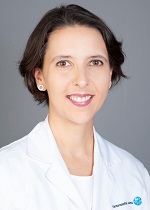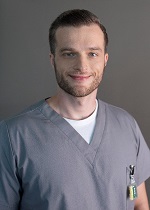EORTC Young and Early Career Investigator Radiation Oncology Scientific Council (Y-ECI ROSC) meets Young ESTRO
Interview with Dora Correia from the EORTC Y-ECI ROSC and Mateusz Spałek from the young section of the European SocieTy for Radiotherapy and Oncology (yESTRO)
Dr Correia, what is the EORTC Young and Early Career Investigator Radiation Oncology Scientific Council (Y-ECI-ROSC)?
The Y-ECI ROSC is a group of motivated young (in training) or early-career radiation oncology professionals (qualified within the last 10 years) who work in European Organisation for Research and Treatment of Cancer (EORTC) member institutions. It was founded in 2022.
What are the goals of the Y-ECI ROSC?
We strive to improve the standard of cancer treatment for patients, the ultimate EORTC mission, by promoting the development of pertinent radiation oncology advances within the EORTC network while fostering collaboration with the various internal working parties and external young professional societies.
What did the Y-ECI ROSC accomplish in its first year?
A core group of approximately 25 members was established, and the chair (Eleonor Rivin del Campo), vice-chair (Morten Hiul Suppli), communications officer (Dora Correia) and secretary (Mikel Egiguren) were chosen. The group includes radiation oncologist members who are aligned to disease-oriented subgroups (DOGs) (who work with ROSC DOG representatives), undecided members (not linked to a specific DOG), medical physicists and radiation therapists. We organised a Spring (virtual) event, a hybrid meeting at ESTRO 2022, and an Autumn (virtual) meeting, at which the core members proposed ideas and topics of interest. Moreover, we started to collaborate with the French young radiation oncology society (SFjRO).
What are the advantages of being part of the Y-ECI ROSC core group?
Membership enables every motivated young investigator in radiation oncology who works in an EORTC member institution and enjoys multidisciplinary networking and brainstorming to engage and become acquainted with EORTC, even if their field of interest is not yet definitive or if they lack support to travel, since most of our activities take place online, and travel grants may be available in certain circumstances. The core group will be changed every three years, unless the member is participating in ongoing projects, in order to ensure that it is a dynamic group of interesting people who are working towards a common goal: to improve cancer care.

Dora Correia
Radiation oncologist consultant (FMH)
Aarau Cantonal Hospital
Switzerland
Y-ECI ROSC Chair
Y-ECI-ROSC@eortc.org / dora.correia@ksa.ch
Dr Spalek, as a melanoma DOG representative core member and a former committee member of yESTRO, how do you think the Y-ECI ROSC can take advantage of its transversality?
I found that I transferred my activities seamlessly from yESTRO (after my term was over) to the Y-ECI ROSC and DOG. First, I met fantastic people in yESTRO and I keep in touch with many of them. Thus, I can help to involve current and future young investigators and liaise between yESTRO and the Y-ECI ROSC. Second, I was, and still am, a representative of the underrepresented part of Europe in pan-European organisations such as ESTRO and EORTC. During my term in yESTRO, I learned that it’s not my weakness but my strength and that I am a kind of vessel between Western and Eastern Europe. Third, I have been involved in many international scientific projects that have resulted in publications. Thus, I have gained unique experience that will be useful in Y-ECI ROSC activities.

Mateusz Spałek
Assistant professor of radiation oncology
Affiliated with the Department of Soft Tissue/Bone Sarcoma and Melanoma
and Department of Radiotherapy 1
Deputy head of the Department of Radiotherapy
Maria Sklodowska-Curie National Research Institute of Oncology
Warsaw, Poland
mateusz.spalek@pib-nio.pl